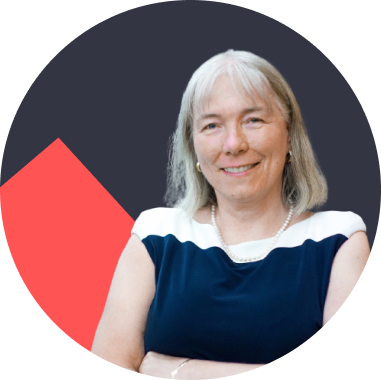What Makes a Strong Team with
Dr. Monika Safford

A Conversation with Dr. Monika Safford
“The goal should not be that you become the expert in everything. The goal should be that you learn how to put teams together who can overcome your weaknesses.”
Bio
Monika Safford, MD is currently a Professor and the Chief of the division of General Internal Medicine at Weill Cornell Medicine. She received her medical degree from Weill Cornell and completed her residency in internal medicine at the University of Pennsylvania. She previously served at the University of Alabama at Birmingham as the inaugural endowed professor of diabetes prevention and outcomes research, Assistant Dean for Continuing Medical Education, Associate Director of the Center for Outcomes and Effectiveness Research and Education. With more than 260 papers published in top tier journals, she’s an expert researcher and has received various grants including a recently awarded $10 million grant by the NIH. She has chaired many national committees, and has been the recipient of many national honors and awards for her contributions to medicine.
What were the major events that shaped your success?
Dr. Safford grew up in a family that was a little bit unusual. “I had a mother who was an immigrant, born in Austria. She remained an Austrian citizen all her life, but she was one of the most ardent defenders of the United States that you could possibly imagine. She grew up in Vienna, during World War II and experienced the Marshall Plan after World War II, and people in her generation really loved America as a result of the rebuilding of Europe after World War II.”
“My grandfather was a physician. He was one of the pioneers in rehabilitation medicine. Then my grandmother on my father’s side was the first PhD in philosophy from the University of Chicago and her mentor was Margaret Mead. So she was a pioneer. My family background is one of the pioneers and I was drawn to medicine because of my grandfather, who was a physician in the 1800s and in Budapest. He was the man who discovered the importance of washing hands, before bacterial infection and bacterial spread were understood.”
Dr. Safford received her training through Dartmouth College and Weill Cornell Medical College. Because there were no women she could find to emulate in academic medicine, this led to a gap year in her academic career. About 10 years after she graduated from medical school, without any research training, she turned her attention to health equity research. There she discovered some terrific colleagues and was recruited to the University of Alabama at Birmingham and that was where her career began to take off.
How have you balanced your personal and professional life?
“For me, it was going into private practice and working part time,” Dr. Safford responded. “I still think that academic or clinical medicine is an extremely challenging field, especially if you’re in one of the intellectual pursuits.”
“I think the same sorts of pressures for work and life balance exist today, and I am a very big fan of part time private practice if you can afford it.” Dr. Safford admits this is not going to be a reality for everyone, especially if they come from a disadvantaged background or took large loans for medical school. But for those who can, this is the path she encourages.
“I highly recommend to people, to women especially, or whoever is going to be the primary caregiver for the child to work part time so that you can have more unhurried time with your children.”
“Until my youngest child was in kindergarten, I worked four days a week at most and that was, in retrospect, one of the best things I ever did. It didn’t advance my academic career, but it certainly made me happy. I think that’s really what it’s all about, the pursuit of life, liberty and happiness.”
What have you done to maintain an attitude of service?
“The key is teams and diversity on the teams. Often, we say that we have medical teams, but we don’t really function as teams. Part of it is that you have very distinct roles on a sports team. On a well-functioning soccer team, people play their positions. Although we have residents and we have attendings and we have students, we don’t necessarily have those kinds of roles as clearly defined where students are sort of a group.”
“You may have an epidemiologist; you may have somebody who’s a biostatistician. You have a variety of different expertise around the table. Then the job of the leader, of the principal investigator is to make sure that everybody feels very comfortable voicing their opinion, even if it’s in contrast to what is being described, and I encourage that. That is how you stay on your toes because I really want people to challenge what we’re proposing.”
“I think teams are the answer.”
What are the traits and habits of the most successful students you have come across?
“Dedication and fortitude. A research career is a really challenging thing. People must self-reflect and understand their own strengths and limitations. I think that’s a really important part of growth.”
“I think for almost all of my mentees, there is this acceptance or receptivity to the idea that the goal should not be that you become the expert in everything. The goal should be that you learn how to put teams together who can overcome your weaknesses.”
“Of course, there’s a lot of that drudgery, but understanding where your strengths and your limitations are, I think is a key attribute to the successful mentee.”
What is one thing that would be your advice to young physicians?
“I think one of the ironies in life is that you’re usually asked to make gigantic life decisions at a time in your life when you are not equipped to make those decisions in a fully informed way. Where are you going to go to college? Where are you going to go to medical school? Where are you going to go to residency? You always have sort of an inkling, and I think one of the most important lessons is, listen to that inner voice.”
“Examine why you feel something is not right and work hard to find allies who can help you to voice that in a safe way.”
Dr. Safford also believes it is important to voice concerns to others and to maintain a state of constant perseverance. He closes with these words of encouragement, “If it’s really important to you, and you really believe in it, don’t give up!”
Pearls of Wisdom
- Follow your inner voice. Have an open mind and be open to innovation. This will guide you through most of the challenges that you come across.
- Take time for self-reflection. Be honest with yourself and what you do. Hold yourself accountable and identify your weaknesses and strengths.
- Work in teams. Your goal should be to put together a team to overcome individual weaknesses so as to maximize the expertise of each individual.
- Do not be afraid to fail. Take time and reflection to learn from your mistakes.
